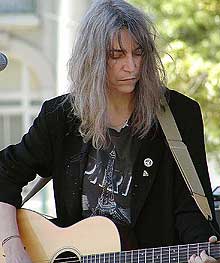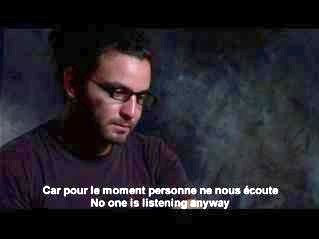
As is usual for me on a Tuesday evening, I did my radio show, "Interzone Radio," on the local college radio station,
KXUA. Yesterday was August 1, the birthday of Jerry Garcia but also, and much more important for me, the birthday of my late mother. If she were still alive, she would be, like me (and my father and the rest of my family), going crazy about what is happening to Lebanon. She lived there from 1964-1972 and simply loved it (again, like we all do).
Last night I decided to play all Lebanese music for two hours. (Playlist is
here.) My decision had nothing to do with my mother, it had everything to do with Lebanon, but doing it certainly made me think of mom. (I've also wanted to eat Lebanese food lately--meaning, since I'm in Fayetteville, that I have to make it myself. I also wish I could get my hands on some
'araq.)
Putting the show together, and then listening to the music, reminded me of what a rich and diverse musical culture Lebanon has. And I only scratched the surface. I focused mostly on the more recent material. Fairuz, of course, mostly songs produced by her son Ziad Rahbani. I still find "El Bosta" from her album
Wahdun (released in 1979), with its disco overtones and cinematic production, to be quite amazing. I played "Ya mariamu" from
Wala Kif, her song in tribute to the Virgin Mary. It's produced by Ziad, has a very Brazilian feel to it, but what is really remarkable is the way she plays with the lyrics, draws out short syllables, making them long, and her timing and enunciation, which is very jazzy. (Reminds me of the best of Sinatra.) Her song, "Li Beirut," the last number of the night, from
Maarifti Feek, nearly brought me to tears. It's a beautiful, beautiful tribute to Beirut; the lyrics are by Joseph Harb:
To Beirut-peace to Beirut with all my heart,
And kisses to the sea and clouds,
To the rock of a city that looks like an old sailor's face.
From the soul of her people she makes wine,
From their sweat, she makes bread and jasmine.
So how did it come to taste of smoke and fire?
And of course I played some Ziad Rahbani, a major singer and performer in his own right. And some Marcel Khalifé, who became known throughout the Arab world in the mid-seventies for his nationalist songs, in particular for his songs set to the poems of celebrated Palestinian poet Mahmud Darwish. I played "Ummi" (Mother) from this period. Khalifé's music from the seventies and eighties is very much identified with the cause of the Palestinians and with the struggle of South Lebanon against the Israeli occupation. In those days, Khalifé could fill football stadiums with fans when he gave concerts. Khalifé is a very talented and innovative 'ud player, his singing voice is marvelous, and he's an ambitious composer. I find much of his work over the last twenty years to be somewhat schmaltzy and over-reaching in its classicist ambitions. But he continues to produce creative and boundary-pushing music. The cuts on
Concerto Al Andalus (2001) where he works with a small ensemble, including his two sons, is really wonderful, with the dynamics of a jazz ensemble, or the classical Arabic
takht.
It's interesting to note that all three of Lebanon's most renowned performers, Fairuz, Ziad Rahbani, and Marcel Khalifé, are Christian, and all are associated variously with progressive, secularist politics. (Joseph Massad discusses Fairuz and Khalifé's engagement with the question of Palestine in the book I co-edited with Rebecca Stein,
Palestine, Israel, and the Politics of Popular Culture.)
I played some cuts from Haifa Wehbe, Nancy Ajram, and The 4 Cats, female artists who are part of that larger cultural phenomenon that
Marc Lynch calls the Lebanese pop tarts. Sassy, fun, sexy, and a huge sensation throughout the Middle East, particularly as a result of their edgy music videos (video clips) that are broadcast by satellite all over the world, and that can now also be found on Youtube.
And some Lebanese hip-hop (from
Clotaire K and
Rayess Bek) and some Lebanese rock (by Monsieur Untel)--the latter cut from a compilation of Lebanese rock and alternative put out by the Lebanese music magazine,
CD-thèque. Another group on that compilation is Soapkills, who I simply adore. They've been described as a Lebanese trip-hop band, which doesn't
quite capture their sound but will have to do. (Listen for yourself at their website
here.) Alas, Soapkill recently broke up--singer Yasmine Hamdan (pictured) has gone solo and Zeid Hamdan is now working with a group called Saboon. I didn't play much "traditional" or "folkloric" Lebanese music, but I did play a cut from the late buzuq master Mohammed Matar.
Finally, in this very small sample of the great diversity of Lebanese music, I spun a cut from Chromatic, "Al Kawafel," which I got from another CD-thèque compilation called
Jazz Is Alive And Well And Living In Beirut. Jazz, rock, Arab pop, classicist-based innovation: alive in Beirut! That was the hope, and that was what was in fact happening in Lebanon as it managed to rebuild itself, post-civil war, post-Israeli occupation, from the mid-nineties until mid-July 2006. That Lebanese musicians manage to produce such vital and creative work, despite the disasters and traumas of the last three decades, is almost miraculous. My show, without being overtly political, at least was an attempt to testify to that spirit.
Will these musicians, and others like them, be able to continue, given the events of the last three weeks?
(Here's a
report on the Beirut's cultural life as a war casualty from Ramsay Short, editor of Time Out Lebanon.)
Tag:
Lebanon







